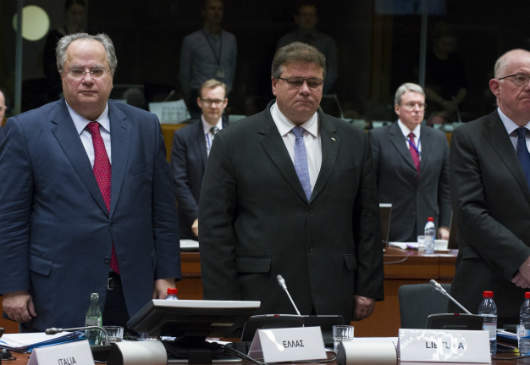 In his intervention during the meeting of the EU Foreign Affairs Council, on Monday, 16 November, in Brussels, Foreign Minister Nikos Kotzias analyzed a number of the aspects of the management of the refugee issue.
In his intervention during the meeting of the EU Foreign Affairs Council, on Monday, 16 November, in Brussels, Foreign Minister Nikos Kotzias analyzed a number of the aspects of the management of the refugee issue.
More specifically, Mr. Kotzias initially highlighted the difficulties that have been noted with the implementation of specific decisions that have been taken bilaterally or on the EU level, stressing the need for there to be shared will and resolve from all parties so that these agreements can be respected and, at long last, function in practice. Mr. Kotzias referred indicatively to the decision on relocation of refugees within the EU countries, to the bilateral Greek-Turkish Readmission Protocol, to the EU-Turkey readmission agreement, and to the EU’s readmission agreements with third countries such as Pakistan.
Mr. Kotzias noted the excessive burden being shouldered by many islands in the Aegean due to the mass influx of refugees, which, based on the data of the past six months, is many times greater than the population of these islands.
Referring to the very short distance separating these islands from Turkey and the very little time required to traverse these distances in speedboats, Mr. Kotzias made the reminder that in these cases, between the Greek islands and the Turkish coast, there are no international waters, but Greek and Turkish waters, for the delimitation of which, based on international law, the median-line principle is being implemented. As the sinking of vessels carrying refugees as soon as they enter Greek territorial waters is a phenomenon observed very frequently, the management of influxes in these cases, based on the principles of international law, is transformed automatically into a search and rescue task.
Mr. Kotzias emphatically underscored that any divergence from compliance with these rules would mean certain death for many more refugees than have already lost their lives on the EU’s maritime borders. This would come into direct conflict not only with international law, but also with Greek tradition and with the humanitarian values that are at the core of European culture. The Foreign Minister added that in no case would the use of military means – as put forward in statements from European officials – be an acceptable solution, as this would also result in the sinking of vessels by bombarding them before they enter Greek territorial waters.
The Foreign Minister called on the members of the Council to realize the decisive role of Turkey in the swelling of influxes by sea and in the overall management of the refugee issue, underscoring that the only solution is the identification, registration and classification of refugees at hotspots on Turkish territory, because in any other case the field remains open for perpetuating the illegal trafficking mechanism that has spread its tentacles into a number of related economic activities.
Mr. Kotzias stressed that Greece is in full compliance with its agreed obligations, having already completed the creation of the first of the five hotspots and moved ahead to the speedy construction of the rest, and he highlighted the need for the process of distribution to the other EU countries to proceed smoothly, as an undesirable scenario of the processing and detaining of the greater portion of refugees on Greek territory would burden our country excessively and would not constitute a joint European response to an issue with vast humanitarian dimensions.
Referring to the recent tragic events in Paris and the possible confirmation of the identification of an involved party as being a person who was registered as a refugee on Greek territory, Mr. Kotzias, echoing the views of other members of the Council, stressed that it is not right to link terrorism with the refugee issue.
Recalling, finally, the deeper causes at work behind the mass movements of populations towards developed countries, Mr. Kotzias noted the example of the United States of America, which, despite the use of cutting-edge technology and extensive deterrents on its borders, has not managed to avert the entry of many millions of illegal economic migrants into its territory.
In closing his remarks, the Greek Foreign Minister asked that there be a unified and clear stance on the substance, the content and the tactical moves of the European policy on the refugee issue, through the taking and implementation of all the necessary measures, without vagueness and without the creation of scapegoats. Mr. Kotzias stressed that Greece will continue to work seriously for the effective management of the phenomenon, with full respect for the fundamental principles of international law and European culture, and without renouncing its fundamental national interests.
November 17, 2015


